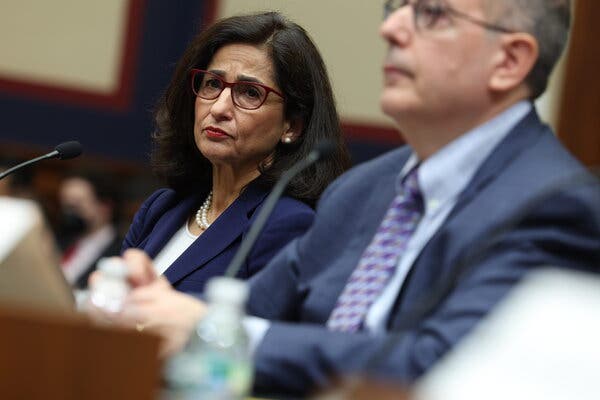Supported by
From ‘Perfect Candidate’ to Sudden Exit: Inside the Fall of Columbia’s President
Nemat Shafik was vilified on almost all sides for her handling of the protests over the Israel-Hamas war. When given an offramp, she took it.

The part-time role in London was unpaid, temporary and only advisory, but to Nemat Shafik, it offered a way out of her beleaguered presidency at Columbia University.
She had arrived in New York only last year for one of academia’s plum jobs: running an Ivy League university with enormous riches and diversity, extraordinary prestige and a heritage that predated American independence. To the university’s leaders, Dr. Shafik was a peerless pick, a globally minded economist with a remarkable personal story, and the first woman to lead Columbia.
These last 10 months, though, since the start of the Israel-Hamas war, had been miserable for Columbia and its president. The university, which Dr. Shafik had championed as a haven for the world’s best minds who could help solve society’s intractable problems, disintegrated into factions. And as Dr. Shafik’s response proved swerving and uneven, she found herself with few allies and facing a campus where she was perceived as insular and rarely seen.
By the time summer break arrived, she had been vilified on campus and in Congress as an ally of antisemites, a turncoat to academic freedom and free speech, and an enfeebled leader who had both allowed pro-Palestinian protests to plunge into lawlessness and been too willing to call in the police. Her home seemed as much a fortress as a residence. And even as summer brought a respite from encampments and protests, university officials so feared the possibility of future trouble that they began weighing police powers for campus security officers.
People who had spoken to Dr. Shafik in recent months came to believe that she was deeply unhappy, and she had told faculty members that she thought there was little trust in her administration.
Ultimately, she decided to resign from Columbia, accept the British Foreign Office’s offer to chair an outside review on development policy and return to her peerage in the House of Lords. The bruising environs of Westminster and Whitehall would be her safe harbor — away from the grandstanding and protesting of an American political season wrapped up with a grinding war many of her students reviled.
In an open letter released on Wednesday night, Dr. Shafik, who goes by Minouche and could not be reached for comment, said ruefully that her 13-month tenure had included “a period of turmoil where it has been difficult to overcome divergent views across our community.” She cited the “considerable toll” on her family and said it had been “distressing — for the community, for me as president and on a personal level — to find myself, colleagues and students the subject of threats and abuse.”
Her departure from Columbia was abrupt, just weeks after she published a letter that gave no hint that she was considering a retreat. But her resignation, which Columbia’s board co-chairs said trustees accepted “regretfully,” would almost certainly not close this contentious era in the university’s 270-year history, or in higher education in the United States.
A congressional investigation is underway, and the blame game for months of turbulence is only beginning. Columbia has interim leadership, and faculty and administrators are bracing for a fall semester of flare-ups that could turn into fodder for the 2024 presidential campaign.
“She started with a lot of hope and optimism, and no one foresaw it ending this way,” said James H. Applegate, a professor of astronomy and a member of a University Senate committee whose authority Dr. Shafik ignored when she summoned the police to campus in April. “That is a tremendous disappointment.”
But, he added, perhaps her decision should not have been all that much of surprise: “At some point you have to say, from Shafik’s point of view, How much longer do you want to put up with this stuff? It’s a toxic hellhole, and it’s directed at her.”
‘Humanity in all its differentiated glory’
It was never going to be all that easy to follow Lee C. Bollinger, the free speech scholar who led Columbia for 21 years. But in January 2023, Columbia’s board announced Dr. Shafik’s appointment with glassy-eyed fanfare. Jonathan Lavine, then the university board’s chairman, pronounced her as nothing less than “the perfect candidate: a brilliant and able global leader, a community builder and a pre-eminent economist who understands the academy and the world beyond it.”
An economist who had fled Egypt with her family during childhood, Dr. Shafik had been educated in the American South before earning degrees from the University of Massachusetts Amherst, the London School of Economics and Oxford University. She was a young star at the World Bank, took a powerful job in Britain’s development agency and went on to senior roles at the International Monetary Fund and the Bank of England. In 2020, she became a cross-bencher in the House of Lords — a bona fide baroness.
She was not, however, steeped in the byzantine world of university governance in the United States. At Columbia, as at many other universities, presidents are not autonomous rulers but essential figures in a shared power structure.
During her formal inauguration on Oct. 4, she framed her address around a question: “What does the world need from a great university in the 21st century?”
In an earlier era, she noted, universities “were kept separate from the world around them.”
“Columbia started as a university for white, Christian men,” she added. “For most of its history, it would have been inconceivable for someone who looks like me to be president of this great institution. Today, Columbia includes humanity in all its differentiated glory, and our world is so much richer for it.”
Three days later, Hamas fighters burst out of Gaza into Israel.
Two days later, Dr. Shafik said she was “devastated by the horrific attack on Israel” and called on people to “reject forces that seek to pull us apart.”
On Oct. 12, only eight days after her optimistic oration, Columbia closed its campus as hundreds of protesters amassed. It was a way of separating itself, for the moment, from the world around it.
Months of turmoil
Shutting the gates resolved little. Protests were exploding on campuses across the country, and Columbia was grappling with ones that some students felt had especially menacing airs of antisemitism and intimidation.
Dr. Shafik moved to tighten rules around demonstrations and, in November, the university was among the first to suspend Jewish Voice for Peace and Students for Justice in Palestine, a pair of pro-Palestinian groups that Columbia officials insisted had defied the rules for staging protests. Critics suspected speech suppression.
Hundreds of students rallied to oppose the suspensions, and a walkout of hundreds of faculty members followed a day later.
For a time, though, Dr. Shafik was able to pursue order and soothe donors largely in private. And she avoided the spotlight in December, when the presidents of Harvard University and the University of Pennsylvania testified before Congress. Their lawyerly answers to questions about antisemitism helped unravel their tenures within a month. (Dr. Shafik was traveling abroad at the time of the hearing.)
But pressure was mounting as protests continued and fears of antisemitism surged.
Then, on April 17, Dr. Shafik took her turn before Congress. Columbia officials had studied the December showdown that had undone the Harvard and Penn leaders, and they settled on a different approach: Dr. Shafik would appear empathetic and conciliatory.
“Does calling for the genocide of Jews violate Columbia’s code of conduct?” Representative Suzanne Bonamici, Democrat of Oregon, demanded early in the hearing.
“Yes, it does,” Dr. Shafik replied, echoing the board co-chairs, Claire Shipman and David J. Greenwald, who had accompanied her to Capitol Hill.
And under persistent questioning from Republicans, Dr. Shafik went into surprising detail about the disciplining of university employees, which is usually confidential.
Congress, for the moment, was at bay. But that morning, students had gone to a grassy quad and pitched tents. They posted a sign: “Gaza Solidarity Encampment.”
Dr. Shafik decided to call in the police, violating, in the view of many professors, university protocol since members of the University Senate had warned her not to.
At Columbia, few decisions are as freighted as summoning the New York Police Department. In 1968, the police were infamously brought in to quell protests and made more than 700 arrests, a decision that shadowed the university for decades and hamstrung applications and donations alike.
Dr. Shafik’s choice led to more than 100 arrests and propelled Columbia to the center of a national firestorm, turning the campus into a symbol of a springtime protest movement that ultimately led to thousands of arrests across the country.
Faculty members began discussing a censure, a humiliating punishment. Dr. Shafik, students and professors railed, was stifling speech and threatening the academic freedom that had been sacrosanct for generations.
Worse yet for Dr. Shafik, the arrests only emboldened many of the demonstrators, who promptly reconstructed their encampment. Rumors swirled that the National Guard would be deployed to the campus, and House Speaker Mike Johnson, with a group of Republican lawmakers, held a news conference at Columbia on the steps of the Low Library. According to Mr. Johnson, he stood in Dr. Shafik’s office and told her to quit.
She refused, much like the protesters who were rebuffing demands that they pack up.
Then in the early hours of April 30, protesters captured Hamilton Hall, a building that demonstrators had occupied in 1968.
Columbia had days earlier said that bringing the N.Y.P.D. to campus again would be “counterproductive,” but Dr. Shafik called in the police once more. Hundreds of officers marched through the campus that night. The occupation, Dr. Shafik said, had left her with “no choice.”
The dozens of arrests satisfied few. Protesters and their allies were furious over the return of the police. Others demanded to know how Dr. Shafik had allowed such disorder to reign in the first place.
The besieged university, with its gates closed and many students opting for remote classes, staggered to the end of the semester. Columbia canceled its main commencement event, and Dr. Shafik stayed away from each of the smaller ceremonies.
London calling
Summer arrived, dimming the chaos, though Dr. Shafik soon found her university putting three deans on leave for text messages that she said “touched on ancient antisemitic tropes.” (The deans resigned this month. A fourth administrator who was involved in the exchanges to a lesser degree, Josef Sorett, remains at Columbia.)
Soon after the “Textgate” scandal, as it became known on campus, a resurgent, recalibrated Labour Party in Britain thumped the Conservative Party in a general election. At the Foreign Office, Britain’s new top diplomat, David Lammy, ordered a trio of reviews to examine policy.
Sometime over the last month or so, the government reached out to Dr. Shafik to see whether she would chair an advisory committee on development policy. The role was not conceived as a post-Columbia landing spot for Dr. Shafik, according to a British official who, in line with government protocol, spoke on the condition of anonymity.
To accept the position, Dr. Shafik did not need to step down from Columbia. In fact, the government was recruiting other high-profile outsiders to scrutinize British policy with no expectation that they would vacate other roles.
Dr. Shafik agreed to the post. And to the surprise of some in London and New York, she decided to quit Columbia, too.
A last surprise
Columbia planned to announce Dr. Shafik’s exit on Thursday, but word began to bubble up on Wednesday evening. There was little time to warn people of the seismic change, including that the board had selected Dr. Katrina A. Armstrong, the university’s executive vice president for health and biomedical sciences, as Columbia’s interim leader.
A campus consumed by months of tumult found itself stunned anew.
“I’ve had calls since seven in the morning,” Costis Maglaras, the dean of the business school, said on Thursday. “I think people are sad to learn that Minouche has stepped down, but people are now facing forward and sort of rallying around Katrina.”
But to some on campus, Dr. Shafik’s eventual collapse had been all but certain since April.
Brendan O’Flaherty, a Columbia economics professor, believed that her willingness to discuss disciplining professors by name before Congress “was her undoing with the faculty.”
“For large numbers of faculty, that’s a major, major sin, which she did not repent of,” he said.
The university did not say when Columbia would begin a search for a permanent president. And the University Senate is planning to have a commission study the events of recent months, much as Columbia did after the 1968 protests.
For now, many at Columbia are turning toward the start of classes on Sept. 3 and whatever the new semester may bring.
Dr. Applegate said, “I won’t be surprised if there’s an encampment on the first day of classes.”
In the meantime, Dr. Shafik’s critics in Washington, the politicians who insisted she had caved to chaos, celebrated her exit. So did Students for Justice in Palestine, a group Columbia suspended on her watch.
Anemona Hartocollis contributed reporting.
Alan Blinder is a national correspondent for The Times, covering education. More about Alan Blinder
Stephanie Saul reports on colleges and universities, with a recent focus on the dramatic changes in college admissions and the debate around diversity, equity and inclusion in higher education. More about Stephanie Saul
Sharon Otterman is a Times reporter covering higher education, public health and other issues facing New York City. More about Sharon Otterman
Mark Landler is the London bureau chief of The Times, covering the United Kingdom, as well as American foreign policy in Europe, Asia and the Middle East. He has been a journalist for more than three decades. More about Mark Landler
Colleges and the War in Gaza
News and Analysis
The resignation of Columbia University’s president, Nemat Shafik, was met with mixed reactions, but some on campus are optimistic for a fresh start. Dr. Katrina Armstrong was appointed as the university’s interim president.
Harvard University appointed John Manning, a conservative legal scholar, as provost, the university’s second-highest leadership position. He had been serving as interim provost, and is considered a top contender for university president.
A federal judge temporarily barred the University of California, Los Angeles, from allowing protesters to block Jewish students from having access to the campus, saying it violated religious freedom rights.
Read More
A Fake Campus Protest: A police procedural staged a tent encampment for a film shoot at Queens College. Pro-Palestinian demonstrators felt it trivialized their movement.
Defining the Consequences of Israel Protests: A Wall Street law firm is requiring job applicants to explain their participation in protests. Critics see the policy as a way to silence speech about the war.
Familiar Methods With Different Outcomes: Pro-Palestinian student activists at a university in Brussels have borrowed from the U.S. playbook of encampments and slogans. The results, however, have been starkly different.
Advertisement



